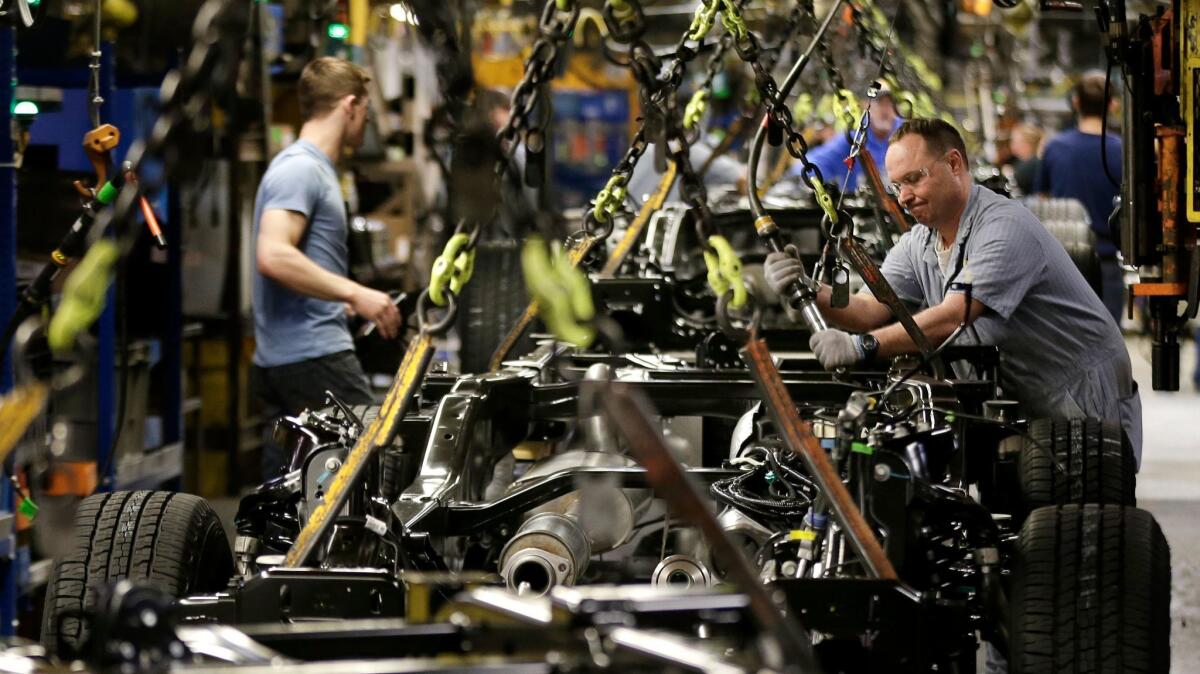Op-Ed: How to improve NAFTA

- Share via
A few days after marking its first 100 days in office, the Trump administration closed in on another milestone: $300 billion. That’s the total value of goods that crossed U.S. borders with Canada and Mexico between Inauguration Day and April 29.
President Trump was presented with a similar data point before he tacked away from a decision to “terminate” the North American Free Trade Agreement. According to the Washington Post, Commerce Secretary Wilbur Ross showed the president a map indicating areas of the United States that would be harmed by the collapse of NAFTA, including many that are home to the president’s core supporters. Canada is the number one destination for U.S. exports. Trade with Mexico supports 6 million American jobs, from corn farmers in Iowa to auto workers in South Carolina. With integrated manufacturing, it’s more accurate to speak of a North American auto industry than a strictly American one.
After the briefing, and phone calls with the leaders of Mexico and Canada, Trump announced that he’d defer termination in favor of renegotiation. This is encouraging news. Not only did Trump avoid a crisis that would have hit U.S. manufacturing, services, farming and consumers, he also recognized a central, underlying truth about the much-maligned trade deal: It is wiring that connects and provides power to large parts of the American economy.
But it needs an update. We each endeavored during the Clinton and Obama administrations to improve the NAFTA agreement to better serve American workers and consumers. We see an opportunity to seize this challenging political moment and grow the U.S. economy in ways that benefit more Americans, including those who’ve rallied behind Trump’s anti-free-trade message, by modernizing NAFTA.
NAFTA is wiring that connects and provides power to large parts of the American economy.
U.S. negotiators should not throw up barriers to trade or impose border taxes, which will inflict collateral damage on millions of American workers and consumers. Rather, they should write rules for economic areas not included in the original agreement a quarter century ago, including energy, digital trade and e-commerce. There is also room to strengthen enforcement of labor and environmental standards and increase the domestic content required for cars and other products; indeed, rules of origin for NAFTA are tweaked on a regular basis. These updates, handled carefully, should make the United States more competitive globally, not less.
The administration can further use negotiations to advance American interests in areas such as regional security and immigration. Of course these topics are already under discussion. Over the last four years, the U.S.-Mexico High Level Economic Dialogue has, among other things, established a shared, data-based framework for identifying new border infrastructure needs, developed a common agenda for smoothing business regulations and promoted the seamless flow of energy across the border.
NAFTA has always been a means to an end larger than trade. It cemented ties with our neighbor to the north. It was instrumental in helping the United States and Mexico climb out of a deep hole of mutual distrust and hostility. Both of us have made many official trips to Mexico. We’ve witnessed the breathtaking shift in the image of the United States from negative to positive. NAFTA deserves much of the credit for transforming North America from a region characterized by suspicion into one where together we can confront transnational security and economic threats.
Any upcoming renegotiation of NAFTA with our neighbors also provides an opening for self-examination. Many Americans feel left behind by the global economy. The great challenge of our time is how to address this critical issue— not with an insufficient Trade Adjustment Assistance package tacked onto a free trade agreement, but holistically. We must develop a robust, independent strategy to arm American workers with the skills they need to adapt not only to globalization but also to technological advances.
Trump’s campaign placed concerns about NAFTA front and center. He now leads a nation — and an administration — that is deeply divided over its approach to trade. As he learns more about the realities of NAFTA, he has an opportunity to improve it. At the same time, our nation must develop a robust domestic job training strategy and strengthen the safety net for American workers. That’s what “winning” on trade requires.
Mack McLarty was White House chief of staff and special envoy to the Americas under President Clinton. Penny Pritzker was secretary of Commerce under President Obama.
Follow the Opinion section on Twitter @latimesopinion or Facebook
More to Read
A cure for the common opinion
Get thought-provoking perspectives with our weekly newsletter.
You may occasionally receive promotional content from the Los Angeles Times.









